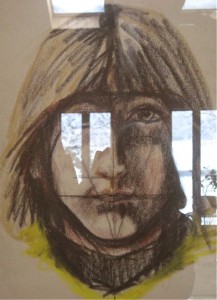Love is of spirit; sex is of body. Our deepest challenge as human beings is to reconcile our ethereal, eternal spirit —that which precedes and succeeds our current life— with our corporal, animal, instinctual, physical body —that which has a definite beginning and a definite end. Animal/Spirit, Soma/Psyche, Finite/Infinite; these are the oppositions we are forced to suffer if we are to achieve fulfillment and solve the true riddle of life on this plane. Of course, there are those who would argue, with rational stamina and certainty, to the contrary.
At a recent dinner party, in a somewhat instigative and provocative mood, I posed the question: “What do you think happens when you die?” I got a quick: “Nothing, lights out!” I turned to another: “Lights out!” With this, I just let it rest. My reason wasn’t up to the argument. Lights out is simply a deus ex machina that doesn’t do justice to the paradox of a life fully lived.
I begin with the following paradox: Why, so often, are so many people so sexually dissatisfied with the person they are most secure and compatible with—spiritually in tune with? I suggest that this fragmentation of our spirit and animal selves begins with our birth into family. The family is the matrix we are born into and which ultimately forms the foundation of what we strive for: love and fulfillment. However, the incest taboo creates an impenetrable barrier to the animal that we are: sexual feelings for family members are strictly verboten. The place where we begin our lives, hopefully in unconditional love and security, does not welcome our animal, sexual selves.
I already sense a growing anxiety in my reader at this point, even the mere mention of sex and family can be alarming, such is the power of the incest taboo. Let me assure all, I am a firm upholder of the value and necessity of the incest taboo. The incest taboo is universal, a part of human culture from time immemorial. Some suggest it to be the humanizing instinct, a powerful archetype governing the behavior of the human animal. My focus here is examining its impact on splitting the psyche, the bearer of love, from the body, the bearer of sexuality. This universal fragmentation is a necessary consequence of being human, a wound that haunts the individual in acceptance of his or her instinctual nature. The consequence for relationship is the challenge of bringing love and sex together in relation to one person.
I stress that I am writing about the incest taboo and not incest. I have spent much of my professional life helping clients traumatized by familial violations of this taboo. My purpose here is to point out the inevitable consequence of the taboo: the splitting of love and sex. The incest taboo demands that family, as our first and often deepest experience of love, completely disallow our animal, instinctive, sexual selves from attaching to the same object of our deepest love. This most primal experience of love, rejects, denies, and repels the animal, which must be repressed, ignored, sentenced to the darkness and reserved for some future expression elsewhere, beyond the family. The byproduct of this most necessary separation of sexuality from family is the experience that love and sex are incompatible. This is the indelible primal imprint that we all take forward into adult life.
This is the incest taboo wound, the archetypal fall that we all suffer. Once man stole consciousness, that is, spirit, he was thrown out of the paradisal garden of instinctual freedom. In life, we strive desperately to return to the garden but are saddled with the split between our spirit and our body. We cannot return to the garden as full human beings —psyche and soma— if we cannot merge love and sex in a relationship with one person. We are granted respites in the garden when we mysteriously fall in love. In this bewitching time of falling in love, we reenter the garden, fully united in spirit and body: paradox resolved, psyche and soma as one. Our animal selves are fully released as we unite with our lover in carnal and spiritual bliss.
Unfortunately, the spell of falling in love is time-limited and soon we must return to the barrenness of life outside the garden, as we discover mother, father, sister, brother, in the eyes and behaviors of our lover. Once our lover becomes too familiar, the incest taboo is stirred, with the necessary consequence of the lifting of romance, as we return to the primal dilemma of the incompatibility of love and sex. Sex becomes labored, uncomfortable, avoided, or routine; the animal wants out of this incestuous cage, perhaps through secret fantasy or secret affair. Perhaps bliss can be extended until the arrival of a child in a family. With the addition of child, lovers must contend with a new role in their own relationship. They are now parents as well as lovers, which triggers the prohibitions of the incest taboo in their own relationship and can severely impact a return to a loving sexual relationship.
It was Freud’s bleak view that the achievement we call Civilization, with all its Discontents, is the sublimated byproduct of the incest taboo. Essentially, for him, ego, or spirit, is the psychic humanizing factor that substitutes civilization for its forsaken instinctive, unrealized, incestuous desires.
Jung, from a more positive perspective, viewed the frustrated libido as the birth of the imagination, which offers a venue for the human animal to reconcile psyche and soma, love and sex, and achieve wholeness.
For the seers of ancient Mexico, the resolution of this dilemma never went beyond the body, as they do not recognize a separation of psyche and soma. As I quoted Carlos Castaneda, last week, from The Wheel of Time (p. 199): “All the faculties, possibilities, and accomplishments of shamanism, from the simplest to the most astounding, are in the human body itself.” The seers’ path is to discover the body as solid and as energy, one in the same. For those seers, achieving the fluidity to alternate between these two states —one finite, the other infinite— solves the riddle of life on this plane.
For those engaged in relationship as a path to wholeness, I encourage containment and openness. For a detailed description of this process I refer the reader to The Book of Us, in particular to chapter three, A Jamaican Retreat, Our Alchemical Oven, where Jeanne and I undertook such a journey in this world. By containment, I mean commitment to a process within a sealed relationship. Interestingly, as I was preparing this essay, I opened the latest Psychotherapy Networker magazine. The picture on the cover is of a wedding cake with a bride flanked by two grooms. The title article is called: The New Monogamy, can we have our cake and eat it too? I quote from the article:
“Within the new notion of monogamy, each partner assumes that the other is, and will remain, the main attachment, but that outside attachments of one kind or another are allowed—as long as they don’t threaten the primary connection.” (July/August 2010 p. 23)
This direction in marriage essentially maintains the fragmentation of psyche and soma, as they remain unrealized and un-united in an individual’s relation to one other person. It’s simply another form of triangulation, where the tension of combining love and sex is dispersed, allowing for fragmentary visits to the garden in separate relationships.
With the container sealed there must be openness. By openness, I mean a gradual, but ultimately full revelation of all the truths of the self, including the deepest somatic fears and desires of the animal. This is the healing of the incest taboo wound, as we push beyond its taboos and allow for ultimate spiritual intimacy and animal sexuality to come together with our lover.
The riddle of psyche and soma, the core paradox and challenge of life on this plane can be resolved through many paths: a journey within the self, a journey of relationship, or a shamanic journey. The essential tools in all of these journeys to wholeness are containment of the opposing forces within the self and openness to all the truths of the self inherent in these forces.
If you wish to correspond, please feel free to post a comment below.
Until we meet again,
Chuck
The books mentioned, The Wheel of Time under the Shamanism category and The Book of Us are available in our Store.


